H-1B Visa Challenges and Post-MBA Industry Employment Outlook

Immigration is in a precarious place in the United States. While media tend to focus on asylum and family separation, the Trump administration has taken aim at the H-1B Visa program. As Clear Admit previously outlined, the H-1B is necessary for any foreign-born individuals who want to work in the United States. Part of the Trump administration’s “America First” policy, the increased attention given to this visa program has created multiple issues for international students and the businesses that hire them.
The first issue that most international MBAs who want to work in the United States will face is the lack of companies who are interested in hiring them. According to the 2018 GMAC Corporate Recruiters Survey, only 47 percent—down from 55 percent in 2017—of all companies surveyed in the United States intended to hiring international candidates. Students interested in working in finance, health care, manufacturing, and nonprofit sectors may want to change their plans as these are the sectors least likely to hire internationals. Only 11 percent of health care firms surveyed said they plan to hire international candidates in 2018, while 14 percent were willing, but had no plans. Seventy-five percent—the highest among the reporting industries—said they would not hire international personnel. Seventy-two percent of non-profit/government agencies and 60 percent of manufacturing companies also responded that they would not be hiring international candidates. The best sectors for international graduates are consulting and technology. Thirty-seven and 39 percent, relatively, reported that they plan to hire international candidates. Over a quarter of companies in both industries reported that they would be willing to hire internationally, but did not have concrete plans to do so.

The reason that it is so hard for international MBA graduates is the nature of the H-1B visa process. If an employer chooses an international graduate and is willing to sponsor their application, neither the firm nor the employee can be sure that the employee will be chosen for the visa lottery.
A current international first-year student at Dartmouth’s Tuck School of Business tells Clear Admit that they haven’t second-guessed their decision to attend a U.S. school:
“I do think about visas, but I am not worried. I look at my MBA from a top school as a long-term investment. I am confident it will deliver returns in many ways throughout my future. My advice to other international students is 1) know why you want the MBA and how precisely you want to utilize it before arriving to school and 2) complete the company research and practice to be extra prepared for recruiting.”
The number of international job-seekers in the United States has declined over the last two years from its peak of 236,000 in 2016. However, the number of applicants for H-1B visas remains high—190,000 people applied for 85,000 H1-B visas in 2018, filling the slots in five days, according to a U.S. Citizenship and Immigrant Services (USCIS) survey.
In addition to the small number of slots, applicants have to deal with the fact that USCIS has increased discretion over how visas are distributed. Although they are generally three years in length, H-1B visas under Trump’s USCIS have been of increasingly bizarre lengths. As noted in the lawsuit, ITServe Alliance v. USCIS, USCIS has issued visas that last one day and 12 days. One specific visa was expired for three weeks before it was received by the recipient. This has led to increased uncertainty around international MBA students getting the cover that they need to work in the United States.
If an international MBA student has received their three-year H-1B visa and has their desired position, he or she might run into difficulty being with their loved ones in the United States. H-1B holders can bring their partners over to stay with them on an H-4 visa while they wait for permanent residency; however, the Trump administration has spoken openly about eliminating this program. While legislation has been proffered to ensure that this program stays in place, the legislation’s chances of becoming law are slim to nil.
Although the current situation is grim, there are efforts being made to improve the situation. Tech firms, a primary beneficiary of the H-1B visa program, have been lobbying Congress to increase the 85,000-person cap for the visas. In addition, there is support among both parties in Congress to ensure that the H-4 program stays in place.
However, this might be too little, too late. These various difficulties have caused a decline in the number of international applicants at U.S.-based MBA programs. According to the GMAC 2018 Application Trends Survey Report, in the two years of the Trump administration, the number of international applicants to full-time MBA programs has decreased 13 percent.
With the system as it is oriented now, being an international MBA student will remain challenging. Tuck’s Emma He T’17 suggests that fellow (and hopeful) international students “target companies early, be willing to expand your search areas, and/or leverage your background for potential visa exceptions” in order to “mitigate visa concerns.”
Relief might come in the future, but it appears that putting America first will hurt U.S. MBA programs.
This article has been edited and republished with permissions from its original source, Clear Admit.
Finding Your New Career: What MBAs Need to Know About Aetna

Founded in 1853, Aetna Inc. has long been one of the most successful health care companies in the world. Serving roughly 37 million consumers, Aetna makes it a priority to recruit diverse and dedicated individuals to their team of nearly 50,000 employees throughout the U.S. The company’s wide reach and impact on the world of health care cannot be overstated; last year, the company made headlines with the huge announcement that it would be purchased by CVS in a $69 billion acquisition—a move which one New York Times report said would “reshape the American health care industry.”
With a commitment to finding skilled team members, and with needs ranging from health care to technology to financial services, it’s no wonder that Aetna and MBAs can make a perfect pair. Aetna has a long history of MBA recruitment, offering a Summer Associate Program which was recently named in Vault‘s 2018 “Top Internship Survey” as the second “Best Healthcare Internship” and ninth “Best Financial Services Internship.”
Why MBAs Love Aetna
Even with massive growth and the status of Fortune 50, Aetna can hardly be described as a stuffy or overly bureaucratic workplace. And it’s no wonder with a mission to help people and build a healthier world that that work should start with their own employees. The recognition Aetna has received for their diverse workplace speaks for itself: in 2016, the Human Rights Campaign Foundation named the company among the best places to work for LGBT employees. Other awards include a 2015 “Best Employer Healthy Lifestyles Platinum Award” form the National Business Group on Health, as well ranking in Training magazine’s “Training Top 125” as the 60th best company for employee development.
MBAs may be drawn to a potential Aetna career for its focus on employee development and creating a diverse workforce, but they probably stay for the payday. According to Payscale, MBAs at Aetna can make anywhere from $84,000 to to $10,200, a significant increase from the average salary for those with undergraduate degrees (around $70,000).
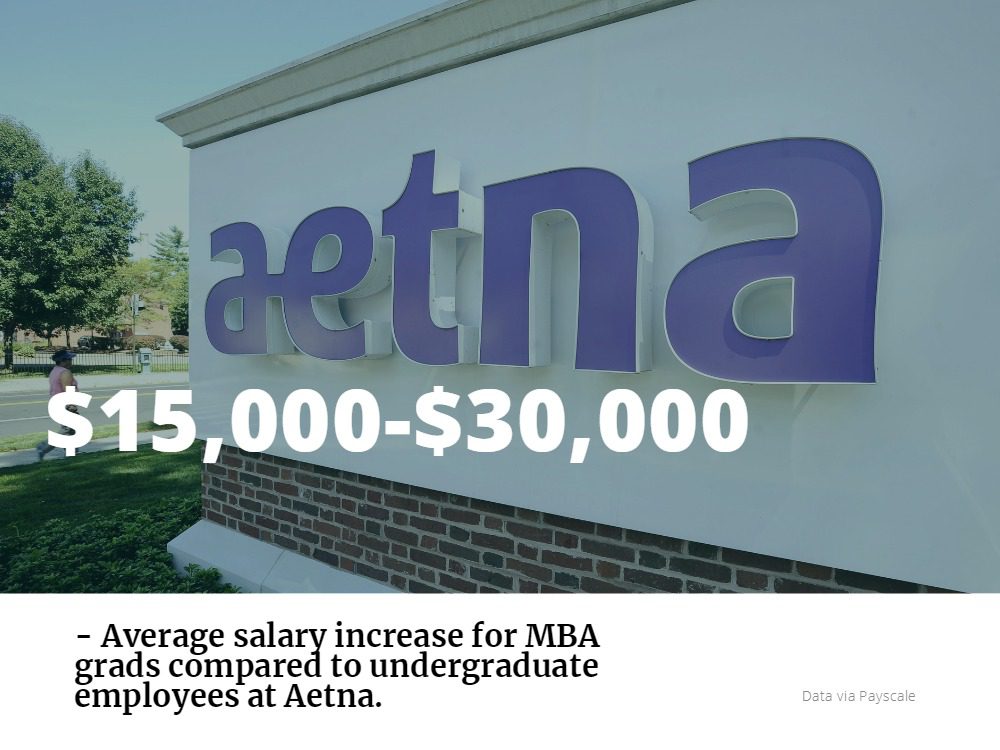
In addition, Aetna’s benefits package truly reflects the company’s strive towards healthy lifestyles. In addition to healthcare, company benefits include coverage for services like counseling, legal and financial support, employee discounts, and access to fitness centers.
Life at Aetna
Aetna offers a number of early career opportunities for recent graduates, which focus on area-specific training and providing access to a network of mentors and experienced professionals. Interested students will find development programs in a wide range of fields, including:
- Actuarial
- Finance
- General Management
- Human Resources
- Information Technology Leadership
- Information Technology Technical Training
- Sales
- Underwriting
The details of each program vary from field to field, but typically span anywhere from three to six years. Most programs also include rotations that will allow students exposure to the wide variety of opportunities open at Aetna, even within a particular area. For example, possible rotations included in the Financial Development Leadership Program include business finance, investor relations, tax, and corporate investment. After the program is completed, graduates will be placed in a full-time position, though the professional development and advancement opportunities will continue long after the program is done.
Landing an Aetna Career
Aetna is an active recruiter of MBAs and interested students should keep an eye out for professional recruiting events and career fairs throughout the country.
Each Aetna career has different requirements, but most early career programs expect applicants to have a GPA of 3.0 or higher, an undergraduate degree in a related field, strong analytical and communication skills, and the ability to succeed in a fast-paced environment.
In addition to the early career program, at the time of writing, there are 16 open jobs that require or strongly prefer applicants with MBA degrees. Below is a small sampling of the types of jobs available to MBA graduates at Aetna:
Product Strategy Manager – New Insurance Plan Design
- The Product Strategy Manager, a position for which candidates with top tier MBA degrees are preferred, will be at the forefront of decisions surrounding what healthcare is and how/where/when its delivered to those in need. According to data reported to Payscale, individuals in this role earn an average salary of $123,000 each year.
National Accounts Product & Solutions Leader
- Requiring an MBA and at least eight years of professional experience, the National Accounts Product & Solutions Director will “execute the product and solution strategy for the company in the national account employer group market” through collaboration as a member of the Large Group Solutions team.
Lead Marketing Analytics Consultant
- The Lead Marketing Analytics Consultant will use statistical predictive models to problem solve and help make decisions. The person in this role will also serve as a key contact for business stakeholders, and must be able to easily convey their predictions and recommendations to senior leadership. For this role, Aetna seeks someone with at least 7 years total business experience with an MBA preferred.
Bloomberg Businessweek Praises Rutgers, and More – New York News

Let’s explore some of the most interesting stories that have emerged from New York business schools this week.
Bloomberg Ranks Rutgers MBA No. 1 in the Northeast in Job Placement – Rutgers Business Blog
In its “Best Graduate Business Schools of 2017 ” survey, Bloomberg Businessweek ranked Rutgers Business School (Newark, New Brunswick) as the top business school in terms of job placement within the Northeastern United States,. coming in second overall in the United States. Andy Heller, RBS MBA ’11 and current senior associate director of payor and health system marketing at Boehringer Ingelheim sang Rutgers’ praises in terms of preparing him to succeed in the corporate world.
“That kind of experience has helped me each and every day since graduation. Having diverse perspectives on our team ensured that our solutions would be differentiated, yet relevant, and impactful,” Heller notes.
In addition, RBS topped its fellow Big Ten competitors when it came to return on investment, narrowly edging out the University of Iowa College of Business, and Northwestern University’s Kellogg School of Management. The latter of which offered a higher multi-year ROI for potential MBA students, but cost much more in terms of tuition.
Read more about Rutgers’ rankings and accolades here.
Are You a Good Fit for the Executive MBA/MS in Healthcare Leadership Program? – Johnson Business Feed
The Executive MBA/MS in Healthcare Leadership program at Cornell’s SC Johnson School of Management “integrates the general management curriculum of Johnson’s Executive MBA programs with the deep healthcare expertise of Weill Cornell Medicine’s Healthcare Policy and Research Department.” The joint program was developed to “reflect the future of healthcare” and help “sharpen and deepen the skill sets of healthcare professionals through business and healthcare leadership education,” according to the school.
“Today’s healthcare leaders need to be open to knowledge from different vantage points so they can advance progressive healthcare agendas, locally and nationally. Many healthcare leadership programs are exclusively for physicians. However, as we developed this new program, the physicians we spoke to expressed interest in an executive healthcare program that welcomed non-clinicians from different sectors of healthcare—not just practitioners.”
Take a look at the makeup of the Executive program below:
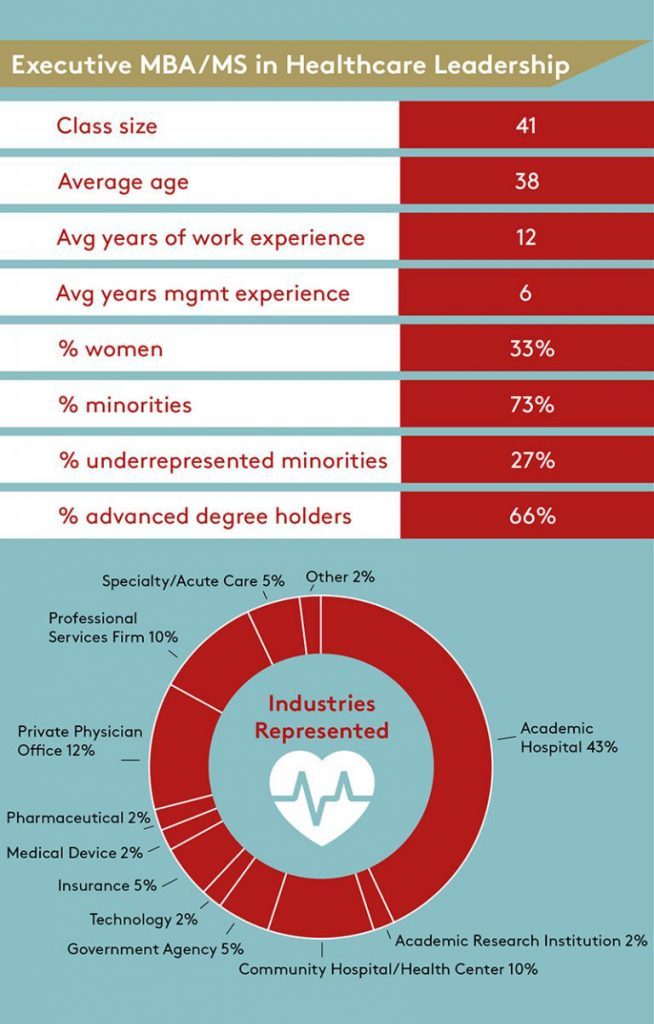
You can read here to learn more about what the program looks for in terms of applicants.
Rewiring Hidden Biases for Better Outcomes – Gabelli Connect
Fordham University’s Gabelli School of Business recently hosted a talk by Harvard professor of social ethics Mahzarin Banaji who unpacked the hidden biases of well-intentioned people—that is, “the beliefs that live in the subconscious and are formulated due to various exposures throughout one’s life.”
Banaji explains:
“A bias is nothing more than a tilting away from neutrality. There’s bias in the mind of the receiver and the applicant. We have to work with the very groups that are holding themselves back and educate those who are holding them back. We are capable of change by how many times we stretch those muscles.”
Learn more about Banaji’s take on unconscious biases here.
Comparing The U.S. News Full-Time and Online MBA Rankings

When it comes to business school rankings, U.S. News & World Report issues one of the most comprehensive annual lists. The annual rankings includes separate lists for the “Best Business Schools” and the “Best Online MBA Programs,” but deciding which format is right for you can still be tricky. Continue reading…
Canada’s MBA Programs are Rising

The recent release of the GMAC 2017 Prospective Students Survey Report revealed some mixed revelations. While the status of smaller U.S. school MBA programs may be up in the air, international programs, particularly in Canada, are looking rosier than ever.
Overall, schools in Canada and Europe saw a 50 percent-plus increase in application volume from international candidates, of which GMAC speculates may be a result of political turmoil, particularly in the United States. This is a direct contrast from four years prior, in which less-than half of the Canada, UK, and other European business schools were seeing international applicant growth.
In the GMAC survey, an anonymous Canadian full-time MBA also noted, “The US presidential election has had a impact on our application numbers. Many international students choose Canada as their first choice.”
Niki da Silva, the Managing Director of the full-time MBA program at the Rotman School of Management at the University of Toronto, recently spoke with the Globe & Mail after the release of the report, saying, “This is our opportunity. We have to be anti-Canadian in this moment and really talk about what we are doing. We don’t tend to do that but we need to.”
By The Numbers
Results from the survey found subtle yet distinct differences between the international applicant pools in the major MBA location destinations.
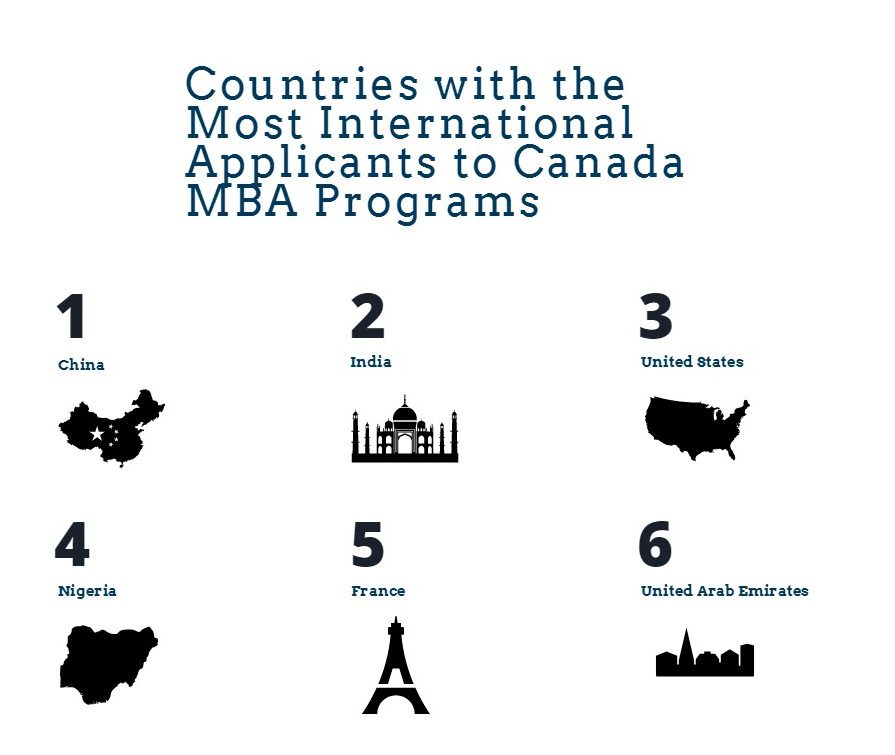
In the United States, Europe, and Canada, according to GMAC, the two most prolific countries with international applicants were unilaterally India and China, which came in either first or second place for each region. However, for Canada, the remaining top 10 international countries with high applicant pools differed slightly from the U.S. and Europe, especially regarding Middle Eastern and North African countries. The United Arab Emirates (6th most), Tunisia (9th), and Iran (10th) were no where to be found in either the U.S. or European top ten.
Breaking the applicant pools down further, GMAC found an unsurprising correlation between the distribution of citizenship by application for Canada and the U.S. and the new data trends. After Europe, which had the most diverse applicant pool (a tricky stat since Europe is qualifying every country on the continent, while the U.S. and Canada are counted as singular entities), Canada had the world’s second biggest international pool of applicants, with less than 50 percent of Canadian business school students having official Canadian citizenship.
Domestic applications, in contrast, are actually down. But the international pool in Canada is swelling, creating substantial overall growth.
“International applicants comprised the vast majority of applications to business programs in Canada—64 percent of MBA applications and 88 percent of business master’s applications.” – GMAC
Gregg Schoenfeld, GMAC’s Director of Research, also noted upward trend for Canadian schools, saying, “This is the first time in the past five years that the majority, in fact three-quarters [of Canadian schools in the survey], are saying they are growing international volumes.”
“From a speculative point of view, it seems that the U.S. political climate has essentially driven candidates to Canada,” he continued.
YOU MIGHT ALSO LIKE: The Highest Starting Salaries for Toronto MBA Grads
The move to enroll more international applicants in Canadian schools started to emerge several years ago. Following lower periods of domestic enrollment, Canada’s MBA programs made a concerted effort to bring in more talent from abroad, creating a multi-year spring in growth that has not only benefited school enrollment, but fostered a positive international environment.
According to Global Affairs Canada, the result has been a positive economic boon as well. Upwards of 90,000 new jobs were created for Canadians just two years prior, while adding $10 billion to the country’s economy.
Tim Daus, Executive Director of the Canadian Federation of Business School Deans, previously noted that the trend was partly made possible because of the country’s flexible immigration policies, saying, “Canada’s visa requirements are much more flexible than other countries’, which gives us an edge. That makes a big difference for students who want to stay and work afterwards.”
Canadian Accolades
The substantial growth Canadian business schools have seen may not solely be the result of political overtones, rather, that many of the country’s best institutions only continue to improve.
The Schulich School of Business at York University in Toronto earned some hefty recognition from Forbes‘ recently released “Best Business Schools” global rankings, earning the 8th spot among the best international two-year program in the world. Schulich grads, Forbes claims, can expect a five-year net gain of over $48,000.
Last year’s Bloomberg BusinessWeek ranking of the best non-U.S. business schools also recognized both the Ivey Business School at Western Canada University and the Rotman School of Management among the top 25 programs in the world. Both the aforementioned Ivey and Rotman programs were recognized among the world’s 100 best by the Financial Times this year as well.
What Employers Do and Don’t Look for In An MBA Graduate

Earning an MBA can often be a huge boost for graduates entering the job market, from opportunities for upper-level management roles to increased salaries.
But securing that job post-graduation can still be an uphill climb. Even with an MBA, students often find themselves struggling to understand how they fit within a changing job market. As the market continues to shift, understanding exactly what employers are looking for in their MBA applicants—and what they aren’t looking for—can be crucial for graduates as they search for and apply for their perfect job.
Thankfully, a recent survey from the Financial Times looked at the job market from the perspective of employers: what they are in need of in terms of MBA job seekers, and how MBA applicants can be more realistic regarding for the roles for which their new degree will qualify them. Unfortunately for many MBAs, the survey results may come as a surprise when they reflect on what skills they hoped their degree would offer in the first place. Yet, a critical understanding of what employers are and aren’t looking for can help job seekers re-frame the way they understand themselves and their prospective careers.
What Employers Want
The survey looked into the most important skills that employers look for in new MBA talent. Perhaps surprisingly, the five most important skills determined by the survey were actually not core MBA subjects. “Soft skills,” such as the ability to prioritize (desired by 72 percent of employers), the ability to work with a variety of people (76 percent of employers), and the ability for employees to effectively manage their time were the most desired and difficult to find, according to the survey.
The most difficult skills to recruit—the skills companies are sorely in need of—were most commonly named as the ability to use social media for the business’ needs, financial forecasting, big data analysis, brand storytelling skills, and the ability to train others.
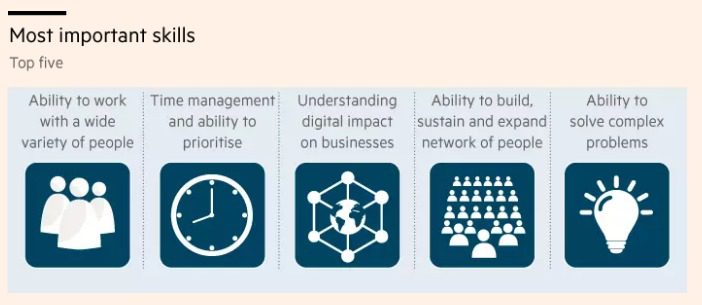
The five most important skills, according to the Financial Times survey.
What Employers Don’t Want
The least important skills for an MBA, according to the survey, were those most often thought of as “hard skills,” such as specialized skills in marketing, finance, programming, or complex statistical skills. Similar skills were mentioned as the least difficult skills to recruit—the ability to solve complex problems and specialized marketing skills are often seen as common fare among MBA graduates and therefore a candidate with such skills won’t necessarily stick out.
Many surveyed employers said that past experience with MBA-holding employees had left them disappointed, with the degree-holder having difficulty turning concepts into practice. Many employers said that, while an MBA degree may be a nice bonus for a job candidate, the overall hiring decision is more based on the individual’s industry qualifications, rather than their degree.
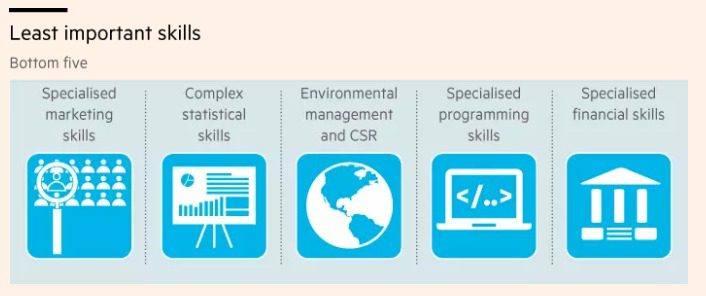
These skills may be less necessary than MBA grads anticipate.
What Do You Need To Do?
So far, the results of the Financial Times survey may be disappointing for MBAs who have worked hard for their business education. No need to get concerned just yet, however. The employer response may have less to do with the idea that the skills of an MBA grad aren’t necessary in a company and more to do with a perception gap; the belief that business schools will not teach students the skills they need, and therefore that they do not need MBAs at their company.
Most of the work in convincing a skeptical employer your degree is worthwhile is simply convincing them that the skills learned as part of your degree are the same ones they desire. Many business schools are attempting to change the way MBAs are perceived and the type of skills that are associated with graduates. Julie Morton, Associate Dean of Careers Services and Corporate Relations at Chicago’s Booth School of Business, has already set half of her team to the work of promoting the value of MBA-holders in the workforce. Overall, much of the work will fall on business schools to market their graduates as holding the skills most desired by recruiters.
On a more individual level, however, the survey results also indicate that MBA grads can be more judicious in the roles that they apply to and the way they market themselves to potential employers. By focusing on the skills desired most—and the hardest to recruit—and ensuring that employers know these are the exact skills an MBA education offers, both employer and employee can benefit.
